- Home
- Cynthia Ozick
Art and Ardor Page 4
Art and Ardor Read online
Page 4
The truth is she had only one subject, the nineteenth century’s unique European literary subject: society. Standard American criticism, struggling to “place” Edith Wharton in a literary environment unused to her subject, has contrived for her the role of a lesser Henry James. This has served to indict her as an imitative figure. But on no significant level is the comparison with James pertinent, except to say that by and large they wrote about the same kinds of people, derived from the same class. Otherwise the difference can be seized in a breath: James was a genius, Wharton not. James invented an almost metaphysical art, Wharton’s insights lay close against their molds: what she saw she judged. James became an American in the most ideal sense, Wharton remained an estranged New Yorker. James was an uncanny moralist, Wharton a canny realist. James scarcely ever failed—or, at least, his few failures when they occurred were nevertheless glorious in aspiration and seamless in execution. When Wharton failed, she fell into an embarrassing triteness of language and seeing.
It is a pity that her name is attached so unrelentingly—thanks to the American high school—to Ethan Frome, a desolate, even morbid, narrow, soft-at-the-center and at the last unsurprising novella not at all typical of her range. It is an outdoor book that ends mercilessly indoors; she was an indoor novelist. She achieved two permanent novels, one—The House of Mirth—a spoiled masterpiece, a kind of latterday reverse Scarlet Letter, very direct yet eerie, the other The Age of Innocence, a combination of ode and elegy to the New York of her childhood, affirmation and repudiation both. A good many of her short stories and some of the novellas (“The Old Maid,” for instance) are marvels of shapeliness and pointedness. This applies also to stories written during her late period, when she is widely considered to have debased her gift. The common accusation—Wilson makes it—is that her prose finally came to resemble women’s-magazine fiction. One can venture that she did not so much begin to sound like the women’s magazines, as that they began to sound like her, a condition that obtains until this moment. No one has explored Wharton’s ongoing subliminal influence on current popular fiction (see almost any issue of Redbook); such an investigation would probably be striking in its disclosure of the strength of her legacy. Like any hokey imitation long after the model is lost to consciousness, it is not a bad compliment, though it may be awkward to admit it. (One of the least likely tributes to the Roman Empire, after all, is the pervasiveness of nineteenth-century American civic architecture.) But The House of Mirth and The Age of Innocence are, like everything unsurpassable because deeply idiosyncratic, incapable of spawning versions of themselves; in these two novels she is in command of an inwardness commensurate with structure. In them she does not simply grab hold of society, or judge it merely; she turns society into an exulting bird of prey, with blood on its beak, steadily beating its wings just over our heads; she turns society into an untamable idea. The reader, apprehensive, yet lured by the bird’s lyric form, covers his face.
She could do all that; she had that power. Lewis, writing to justify and defend, always her sympathetic partisan, nevertheless hedges. Having acknowledged that she had “begun to locate herself—with a certain assurance, though without vanity—in the developing course of American literature,” he appends a doubt:
But in another part of her, there remained something of the conviction drilled into her in old New York that it was improper for a lady to write fiction. One could do so only if one joked about it—if one treated it, to borrow Lubbock’s word, as “an amusement.” She sometimes sounded as if her writing were her entertainingly guilty secret, and in her memoirs she referred to it (borrowing the title of a popular children’s book of her own New York youth) as her “secret garden.”
But in the winter of 1911 [she was then at work on The Reef], as on perhaps half a dozen other occasions, it was the believing artist that was in the ascendancy during the hard-driving morning hours.
Somehow it is easy to doubt that she had this doubt—or, if she once had it, that she held it for long. To believe in her doubt is to make the bad case of the orthodox critics who, unlike Lewis, have shrunk from taking her seriously as an artist because as an American aristocrat she was born shockingly appurtenanced, and therefore deserves to be patronized for her sorrows. To believe in her doubt is to make the bad case of the new feminists, for whom female sex is, always and everywhere, an impediment difficult to transcend—even when, for an obsessed writer of talent, there is nothing to transcend. To believe in her doubt is to reverse the terms of her life and her work. Only “half a dozen other occasions” when Wharton was a “believing artist”? Only so few? This would mean that the life outside her bed—the dressed life of conversation and travel, the matchstick life of drift—was the primary life, and the life with her writing board—the life of the believing artist—the deviation, the anomaly, the distraction.
But we know, and have always known (Freud taught us only how to reinforce this knowledge), that the secret self is the true self, that obsession is confession. For Edith Wharton that is the only acceptable evaluation, the only possible justice. She did not doubt her allegiance. The writing came first. That she kept it separate from the rest was a misrepresentation and a mistake, but it may also have been a species of holy instinct—it was the one uncontaminated zone of her being: the place unprofaned. Otherwise she can be defined only by the horrific gyrations of “a life”—by the spiraling solipsism and tragic drift that led her to small dogs instead of babies, servants instead of family, high-minded male distance instead of connubial friendship, public virtue instead of private conscience, infatuation instead of the love that sticks. Only the writing board could justify these ugly substitutions. And some would say—myself not among them—that not even the writing board justified them.
_____________
Essay published in Commentary, October 1976.
1 Vivian Gornick, The Village Voice, May 31, 1973.
2 Though, to be fair, I have heard of at least one new-feminist literature class that has studied The House of Mirth—evidently because it is so easy to interpret its heroine as the ideal victim.
3 Edith Wharton: A Biography (Harper & Row, 1975). The prizes are the Pulitzer, the National Book Critics Circle Award, and Columbia University’s Bancroft Prize.
Mrs. Virginia Woolf: A Madwoman and Her Nurse
No recent biography has been read more thirstily by readers and writers of fiction than Quentin Bell’s account of the life of his aunt Virginia. Reviewing it, Elizabeth Hardwick speaks of “the present exhaustion of Virginia Woolf,” and compares the idea of Bloomsbury—it “wearies”—to a pond run out of trout. But for most American writers, bewildered by the instability of what passes for culture and literature, envious of the English sense of place and of being placed, conscious of separations that yet lack the respectability of “schools” or even the interest of alien perspectives, stuck mainly with the crudity of being either For or Against Interpretation, the legend of Bloomsbury still retains its inspiriting powers. Like any Golden Age, it promises a mimetic future: some day again, says Bloomsbury of 1905, there will be friends, there will be conversation, there will be moods, and they will all again really matter, and fall naturally, in the way of things that matter, into history.
Part of the special history of the Bloomsbury of mood is pictorial—and this has nothing to do with the art critic Roger Fry, or the painter Duncan Grant. It is not what the painters painted or what the writers wrote about painting that hangs on: it is the photographs, most of them no more official than snapshots, of the side of a house, two people playing checkers on an old kitchen chair set out in the yard, three friends and a baby poking in the sand. The snapshots are all amateur. Goblets of brightness wink on eaves, fences, trees, and wash out faces in their dazzle; eyes are lost in blackened sockets. The hem of a dress is likely to be all clarity, but the heads escape—under hat brims, behind dogs, into mottled leaf-shade. And out of the blur of those hopeless poses, cigarettes, hands on knees, hands over books, anxio
us little pups held up to the camera, walking sticks, long grotesque nose-shadows, lapels, outdoor chairs and tables, there rises up—no, leaks down—so much tension, so much ambition, so much fake casualness, so much heartbreaking attention to the momentariness of the moment. The people in the snapshots knew, in a way we do not, who they were. Bloomsbury was self-conscious in a way we are not. It sniffed at its own perceptions, even its own perceived posterity. Somewhere early in the course of her diaries, Virginia Woolf notes how difficult it would be for a biographer to understand her—how little biographers can know, she said—only from the evidence of her journals. Disbelieving in the probity of her own biography, she did not doubt that she would have her own biographer.
She did not doubt; she knew; they knew. Hatched from the last years of the reign of Victoria, Bloomsbury was still a world where things—if not people, then ideas—could be said to reign. Though old authority might be sneered at (or something worse even than a sneer—Virginia Woolf declared her certainty that she could not have become a writer had her father lived), though proprieties might be outrageously altered (“Semen?” asked Lytton Strachey, noticing a stain on Vanessa Bell’s skirt one afternoon), though sex was accessible and often enough homoerotic, though freedom might be proclaimed on Gordon Square, though livings were earned, there was nonetheless a spine of authority to support Bloomsbury: family, descent, class and community—the sense of having-in-common. Bloomsbury, after all, was an inheritance. Both E. M. Forster’s and Virginia Woolf’s people were associated with the liberal and intellectual Clapham Sect of the century before. Cambridge made a kind of cousinship—the staircase at Trinity that drew together Clive Bell, Saxon Sydney-Turner, and Virginia Woolf’s brother Thoby Stephen was the real beginning of the gatherings at Gordon Square. Bloomsbury was pacifist and busy with gossip about what it always called “buggery,” but it was not radical and it did not harbor rebels. Rebels want to make over; the Bloomsburyites reinforced themselves with their like. The staircase at Trinity went on and on for the rest of their lives, and even Virginia Woolf, thinking to make over the form of the novel, had to have each newly completed work ratified by Morgan Forster and sometimes Maynard Keynes before she could breathe at ease again, The authority of one’s closest familiars is the unmistakable note of Bloomsbury. It was that sure voice she listened for. “Virginia Woolf was a Miss Stephen,” Quentin Bell begins, in the same voice; it is an opening any outsider could have written, but not in that sharp cadence. He is not so much biographer as a later member of the circle—Virginia Woolf’s sister’s son, the child of Vanessa and Clive Bell. He knows, he does not doubt. It is the note of self-recognition; of confidence; of inheritance. Everything is in his grip.
And yet—as she predicted—Virginia Woolf’s biographer fails her. He fails her, in fact, more mournfully than any outsider could. It is his grip that fails her. This is not only because, sticking mainly to those matters he has sure authority over, he has chosen to omit a literary discussion of the body of work itself. “I have found the work of the biographer sufficiently difficult without adventuring in other directions,” he tells us, so that to speak of Quentin Bell’s “sure authority” is not to insinuate that all his data are, perhaps, out of childhood memory or family reminiscence, or that he has not mined library after library, and collection after collection of unpublished papers. He is, after all, of the next generation, and the next generation is always in some fashion an outsider to the one before. But what is in his grip is something more precise, curiously, than merely data, which the most impersonal research can reliably throw up: it is that particular intimacy of perspective—of experience, really—which characterizes not family information, but family bias. Every house has its own special odor to the entering guest, however faint—it sticks to the inhabitants, it is in their chairs and in their clothes. The analogy of bias to scent is chiefly in one’s unconsciousness of one’s own. Bell’s Woolf is about Virginia, but it has the smell of Vanessa’s house. The Virginia Woolf that comes off these pages is a kind of emanation of a point of view, long settled, by now, into family feeling. Stephens, Patties, Fishers—all the family lines—each has its distinct and legendary scent. The Stephens are bold, the Patties are fair, the Fishers are self-righteous. And Virginia is mad.
She was the family’s third case of insanity, all on the Stephen side. Leslie Stephen, Virginia Woolf’s celebrated father—a man of letters whose career was marked not least by the circumstance that Henry James cherished him—was married twice, the second time to Julia Duckworth, a widow with children. Together they produced Vanessa and Virginia, Thoby and Adrian. A child of Leslie Stephen’s first marriage, the younger of Virginia’s two half-sisters, was born defective—it is not clear whether backward or truly insane—and was confined to an asylum, where she died old. Virginia’s first cousin—the child of her father’s brother—went mad while still a young man, having struck his head in an accident. But one wonders, in the retrograde and rather primitive way one contemplates families, whether there might not have been a Stephen “taint.” In a family already accustomed to rumor of aberration, Virginia Woolf, in any case, was incontrovertibly mad. Her madness was distinguished, moreover, by a threatening periodicity: at any moment it could strike, disabling everyone around her. Vanessa had to leave her children and come running, nurses had to be hired, rest homes interviewed, transport accomplished. The disaster was ten times wider than its victim.
And just here is the defect in writing out of family authority. The odor is personal, hence partial. Proust says somewhere that the artist brings to the work his whole self, to his familiars only those aspects that accommodate them. The biographer close to his subject has the same difficulty; the aspect under which Quentin Bell chiefly views his aunt Virginia is not of accommodation but of a still narrower partiality: discommodity, the effect on family perspective of Virginia Woolf’s terrible and recurrent insanity. It was no mere melancholia, or poetic mooning—as, reading Leonard Woolf’s deliberately truncated edition of her diary, we used to guess. A claustrophilic though inspired (also self-inspiring) document, it made us resent the arbitrary “personal” omissions: was it the madness he was leaving out? Certainly we wanted the madness too, supposing it to be the useful artistic sort: grotesque moods, quirks—epiphanies really. But it was not that; it was the usual thing people get put away for, an insanity characterized by incoherent howling and by violence. She clawed her attendants and had to be restrained; she would not touch food; she was suicidal. Ah, that cutting difference: not that she longed for death, as poets and writers sometimes do for melancholy’s sake, but that she wanted, with the immediacy of a method, to be dead.
Bell’s Woolf, then, is not about the Virginia Woolf of the diaries, essays, and novels—not, in the Proustian sense, about the writer’s whole self. And surely this is not simply because literary criticism is evaded. Bell’s Woolf is not about a writer, in fact; it is about the smell of a house. It is about a madwoman and her nurse.
The nurse was Leonard Woolf. Upon him Quentin Bell can impose no family aspects, rumors, characteristics, old experience, inherited style. He does not trail any known house-scent, like Stephens, Patties, Fishers. Though he shared the Cambridge stairs—Thoby Stephen, Saxon Sydney-Turner, Clive Bell, Lytton Strachey, and Leonard Woolf together briefly formed the Midnight Society, a reading club that met on Saturday evenings in Clive Bell’s rooms—he was not an inheritor of Cambridge. Cambridge was not natural to him, Bloomsbury was not natural to him, even England was not natural to him—not as an inheritance; he was a Jew. Quentin Bell has no “authority” over Leonard Woolf, as he has over his aunt; Leonard is nowhere in the biographer’s grip.
The effect is unexpected. It is as if Virginia Woolf escapes—possessing her too selectively, the biographer lets her slip—but Leonard Woolf somehow stays to become himself. Which is to say, Bell’s Virginia Woolf can be augmented by a thousand other sources—chiefly by her own work—but we learn as much about Leonard Woolf here as we are li
kely to know from any other source. And what we learn is a strange historical judgment, strange but unfragmented, of a convincing wholeness: that Leonard Woolf was a family sacrifice. Without him—Quentin Bell’s clarity on this point is ineffaceable—Virginia Woolf might have spent her life in a mental asylum. The elder Stephens were dead, Thoby had died at twenty-six, Adrian married a woman apparently indifferent to or incompatible with the Bloomsburyites; it was Vanessa on whom the grimness fell. Leonard Woolf—all this is blatant—got Vanessa off the hook. He was, in fact, deceived: he had no inkling he was being captured for a nurse.
Neither Vanessa nor Adrian gave him a detailed and explicit account of Virginia’s illnesses or told him how deadly serious they might be. . . . Her insanity was clothed, like some other painful things in that family, in a jest . . . Thus, in effect if not in intention, Leonard was allowed to think of Virginia’s illnesses as something not desperately serious, and he was allowed to marry her without knowing how fearful a care such a union might be. In fairness to all parties it must be said that, even if Virginia’s brother and sister had been as explicit and circumstantial as they ought to have been, Leonard would certainly not have been deflected from his purpose of marrying Virginia . . . As it was, he learnt the hard way and one can only wonder, seeing how hard it was, and that he had for so long to endure the constant threat of her suicide, to exert constant vigilance, to exercise endless persuasive tact at mealtimes and to suffer the perpetual alternations of hope and disappointment, that he too did not go mad.

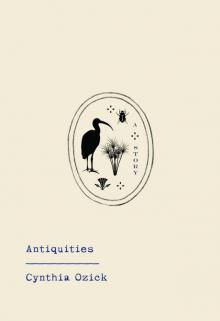 Antiquities
Antiquities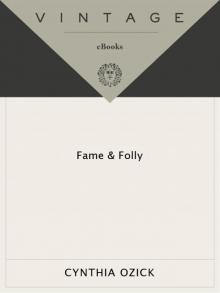 Fame & Folly
Fame & Folly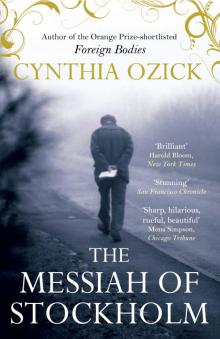 The Messiah of Stockholm
The Messiah of Stockholm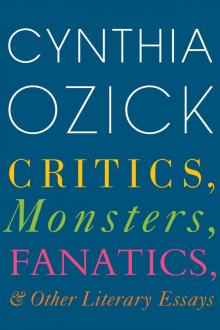 Critics, Monsters, Fanatics, and Other Literary Essays
Critics, Monsters, Fanatics, and Other Literary Essays Heir to the Glimmering World
Heir to the Glimmering World The Din in the Head
The Din in the Head Dictation
Dictation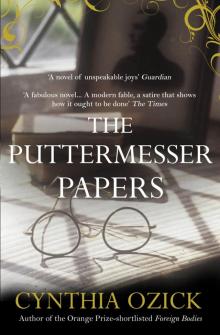 The Puttermesser Papers
The Puttermesser Papers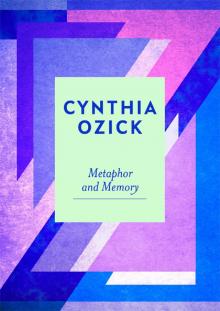 Metaphor and Memory
Metaphor and Memory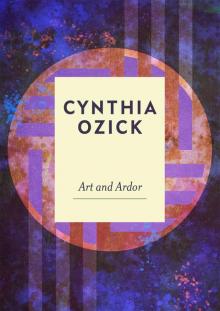 Art and Ardor
Art and Ardor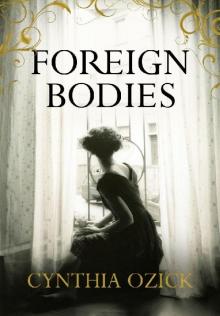 Foreign Bodies
Foreign Bodies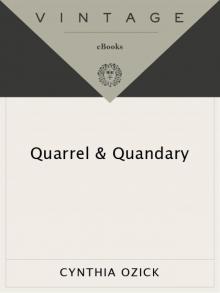 Quarrel & Quandary
Quarrel & Quandary